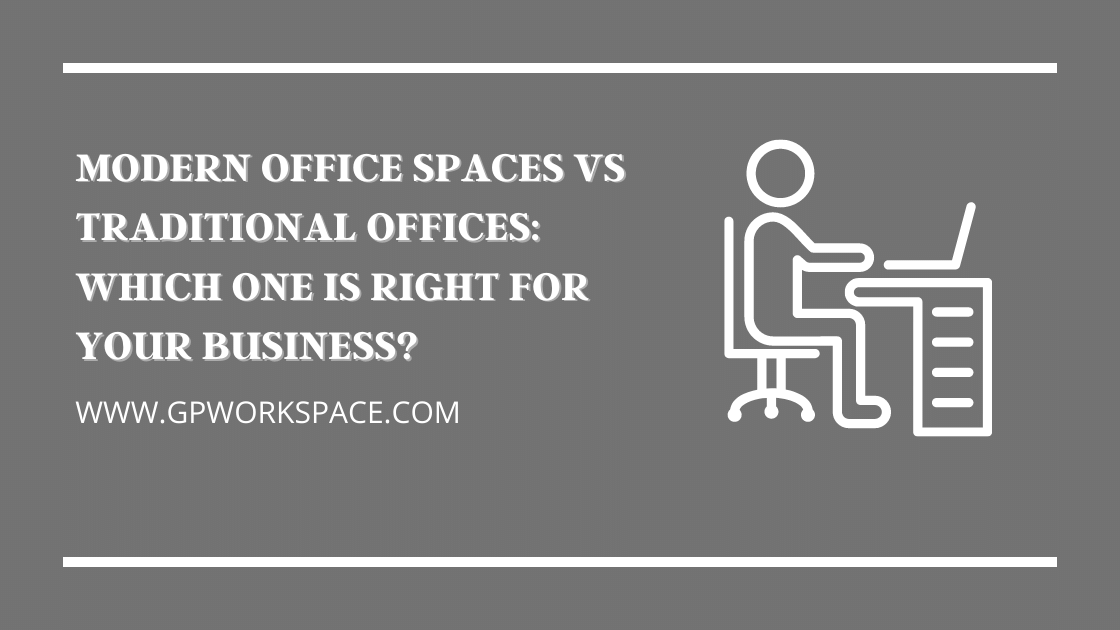In recent years, office spaces have undergone significant changes, with modern offices emerging as a new trend. The shift to modern office spaces has been driven by various factors such as the need to enhance collaboration, promote creativity, and increase productivity. However, some businesses still prefer traditional office spaces due to their familiarity and sense of professionalism. Which one is right for your business? In this blog, we’ll explore the key differences between modern and traditional offices and help you decide which one suits your business needs.
What is a Modern Office Space?
A modern office space refers to a workspace that embraces new technologies, designs, and trends to promote productivity, collaboration, and creativity. Some of the features of modern offices include:
- Open-plan layouts – Modern offices have an open-plan layout that eliminates barriers and promotes collaboration. The absence of walls and partitions allows employees to interact freely, share ideas, and work together towards common goals.
- Ergonomic furniture – Modern offices prioritize the comfort of their employees by providing ergonomic furniture for working such as standing desks, adjustable chairs, and footrests that promote good posture and reduce the risk of health problems such as back pain.
- Green spaces – Modern offices incorporate green spaces such as indoor plants and gardens that promote relaxation and creativity. The presence of nature in the workplace has been shown to boost productivity and reduce stress levels.
- Advanced technology – Modern offices leverage advanced technologies such as cloud computing, video conferencing, and virtual reality to enhance collaboration, communication, and productivity.
What is a Traditional Office Space?
A traditional office space is a workspace that follows conventional designs and practices. Some of the features of traditional offices include:
- Cubicles – Traditional offices have cubicles that offer employees privacy and minimize distractions. Cubicles are usually separated by walls or partitions that provide a sense of personal space.
- Formal layout – Traditional offices have a formal layout that comprises private offices for senior executives, meeting rooms, and a reception area. This layout promotes a sense of hierarchy and professionalism.
- Limited technology – Traditional offices use basic technologies such as desktop computers, landline phones, and fax machines. While these technologies are functional, they may not be as efficient as modern technologies in enhancing collaboration and productivity.
- Lack of flexibility – Traditional offices are rigid in their designs and practices, and employees are expected to follow strict schedules and work in fixed locations.
Pros and Cons of Each Office Type
Now that we understand the key features of modern and traditional office spaces, let’s explore their pros and cons to help you decide which one suits your business needs.
Pros of Modern Office Spaces
- Enhanced collaboration – Modern office spaces promote collaboration by eliminating barriers and encouraging interaction between employees. This creates a sense of community and promotes creativity, innovation, and problem-solving.
- Increased productivity – Modern offices prioritize the comfort of employees, providing ergonomic furniture and green spaces that reduce stress and promote well-being. This has been shown to enhance productivity and reduce absenteeism.
- Advanced technology – They leverage advanced technologies that enhance collaboration, communication, and productivity. This improves efficiency and reduces costs associated with outdated technologies.
- Attract top talent – Modern office spaces are designed to attract top talent by providing a comfortable, flexible, and inspiring work environment. This helps businesses attract and retain the best employees.
Cons of Modern Office Spaces
- Distractions – Open-plan layouts in modern office spaces can be noisy and distracting, reducing concentration and productivity.
- Lack of privacy – Modern office spaces promote collaboration but may not provide enough privacy for employees who require quiet spaces to work.
- Cost – Modern office spaces may be expensive to set up and maintain, particularly for small businesses on tight budgets.
Pros of Traditional Office Spaces
- Formality – Traditional office spaces promote a sense of professionalism, which may be necessary for businesses in certain industries such as law and finance.
- Privacy – Traditional office spaces provide employees with privacy and quiet spaces to work, which can enhance productivity.
- Familiarity – Traditional office spaces are familiar and comfortable for employees who are used to working in cubicles and private offices.
- Cost-effective – Traditional office spaces may be more cost-effective for small businesses that do not require advanced technologies or fancy amenities.
Cons of Traditional Office Spaces
- Lack of collaboration – Traditional office spaces may hinder collaboration and communication between employees, leading to silos and a lack of innovation.
- Lack of flexibility – Traditional office spaces may not offer the flexibility and freedom that modern office spaces provide, which can limit employee creativity and motivation.
- Outdated technology – Traditional office spaces may use outdated technologies that are less efficient and may increase operational costs.
- Boring environment – Traditional office spaces may lack the creativity and inspiration that modern office spaces provide, leading to a boring and uninspiring work environment.
Which One is Right for Your Business?
When it comes to choosing between modern and traditional office spaces, there is no one-size-fits-all solution. The decision depends on your business needs, culture, industry, and budget. Here are some factors to consider when choosing between modern and traditional office spaces:
- Industry – If you are in a traditional industry such as law or finance, a traditional office space may be necessary to maintain a sense of professionalism and formality.
- Culture – If your company culture values collaboration, creativity, and innovation, a modern office space may be more suitable.
- Budget – If you have a limited budget, a traditional office space may be more cost-effective than a modern office space.
- Employee preferences – It’s important to consider your employees’ preferences when choosing between modern and traditional office spaces. Some employees may prefer a quiet and private work environment, while others may thrive in an open and collaborative workspace.
In conclusion, both modern and traditional office spaces have their pros and cons, and the decision on which one to choose depends on your business needs, culture, and budget. It’s important to consider your employees’ preferences and ensure that the office space you choose enhances productivity, collaboration, and well-being. Whether you choose a modern or traditional office space, the key is to create a productive work environment that inspires creativity, promotes innovation, and fosters a sense of community and belonging among your employees.
Find Your Perfect Florida Office Space
GP Workspace is a top choice for businesses looking for office space in Florida. With modern, flexible, and customizable office solutions, GP Workspace provides businesses with the tools they need to succeed. Whether you’re looking for a private office, a coworking space, or a virtual office, GP Workspace has a range of options to fit your unique needs.
With GP Workspace, you’ll have access to state-of-the-art technology, premium amenities, and a supportive community of like-minded professionals. Don’t hesitate to contact us at (754) 354-5861 or schedule a tour for more information on how to ensure you work seamlessly.



